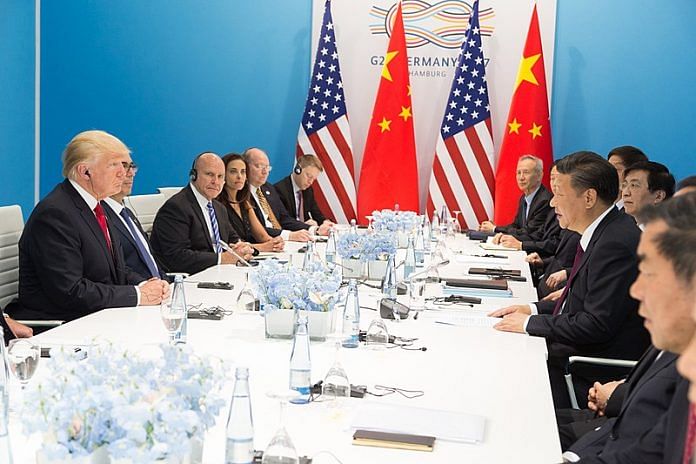As President Trump prepares for his visit to China and East Asia, Jeffrey Bader, Kevin Rudd and Graham Allison offer different perspectives on China.
The first week of October was a bonanza week for China watchers at Harvard. First up was Jeffrey Bader, a senior Fellow at Brookings Institution and one of Presidents Obama’s principal advisers on Asia until 2011. His talk as part of ‘Critical Issues Confronting China’ series focused on President Trump’s China policy and numerous policy issues confronting Trump’s diverse team as it prepared for his visit to China in November.
Skeptical and reasonably alarmed over several areas, including China’s appetite for small islands, the Belt Road Initiative that he likened to a possible Trojan Horse and emerging Chinese mercantilism in Africa and Latin America, Bader called for equilibrium and spine in Trump’s policy towards China. Despite many commentators urging India to join the Belt Road Initiative, New Delhi remains cautious about the project for similar reasons that point towards the inevitability of getting sucked into a Chinese dominated initiative that would have ‘no comebacks’ considering the large investments involved. India’s strategy towards Chinese mercantilism in Africa is a measured and right one that avoids needless competition and concentrates on something that India does best — capacity building.
Cautioning Trump against banking too much on a seemingly excellent personal rapport with Xi, particularly in terms of expectations of reigning in a truant and belligerent North Korea, Bader argued that China will not alter its national interest for personal equations. It is in a similar vein that PM Modi looks at the overt bonhomie that is seen at most of his meetings with Xi; India’s experience of coercive PLA behaviour whenever leaders of the two countries have met in India is testimony to this ambiguity.
So, then what are the expected outcomes of Trump’s visit to China. On the top of the list will be North Korea, freedom of navigation in the global commons of which the US considers the South China Sea to be part of and addressing China’s concerns over the ongoing build-up of military capability in South Korea and Japan.
Over North Korea, the US is convinced that China holds the key to keeping North Korea under check or even going the distance in helping disarm the rogue state. Sceptics like Oliver Schell and Jeffrey Bader argue that if China wants it can choke North Korea completely by blocking all lines of communications, including airline connectivity; cutting off trade links and oil supplies and electronically isolating the military regime. However, just as China is willing to keep India under pressure by supporting a proxy state like Pakistan that harbours Jehadis who are known to influence Uighur separatists in Xinjiang, it considers North Korea as a manageable ‘nuclear cheque’ that it could cash in return for some sizable strategic concessions from the US. It is this ambiguity that frustrates and prevents US policy makers like defence secretary Mattis and others like NSA McMaster from articulating a ‘doable’ North Korea strategy.
Kevin Rudd, the former Australian PM, is a well-known China hand with a terrific sense of humour; and when you have him engaging in a discussion with someone like Graham Allison, the former director of The Belfer Center at the Harvard Kennedy School over China and Korea, you had better listen carefully.
Indian policy makers would remember that it was during Rudd’s tenure as PM that Australia declined to participate in Exercise Malabar out of deference to possible Chinese reaction during a time when Australia was opening its economy to China and exploring possibilities of even deepening its strategic relationship with it. Graham Allison, on the other hand, suggests in his rather provocative book, Destined for War: Can America and China Escape Thucydides’s Trap, that China, a rising power, could soon start pushing for a military confrontation with an established power, the US, which it feels is in decline.
While Allison argues that the US must be more than wary of the rise of China’s military capability, Rudd argues that there is adequate scope for managing and engaging China in areas like countering climate change, information technology initiatives and artificial intelligence in what he interestingly calls as strategy of ‘constructive realism’ that seeks to leverage ‘low hanging fruit’. This immediately made me draw comparisons with attempts within India’s strategic establishment of identifying areas of convergence with China, which is proving to be an exercise in futility.
The fundamental story, however, is that China is playing a waiting game for a decisive strategic shift to make its move vis-à-vis its perceived adversaries and competitors. In the meantime, it is Chinese Checkers in the Korean Peninsula, a game that may not end even after Trump’s forthcoming visit to the region.





Tough or painful! If the decision to check the dragon is not taken today it would be too late for US. If US doesn’t take the leadership role all its allies will have their own ways of handling China. It will ultimately lead to quickening the downfall of US.